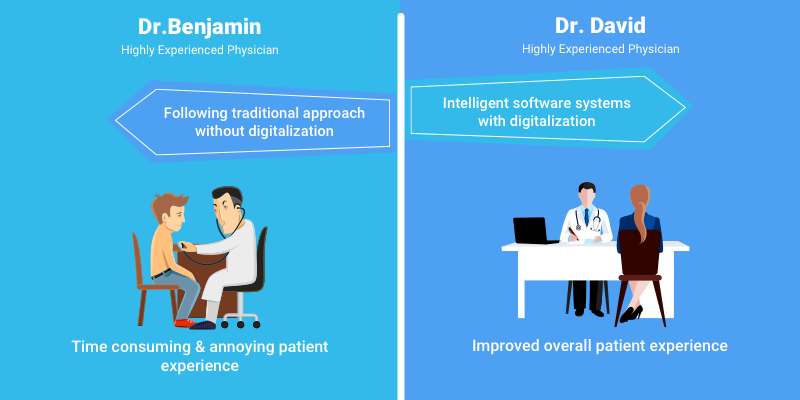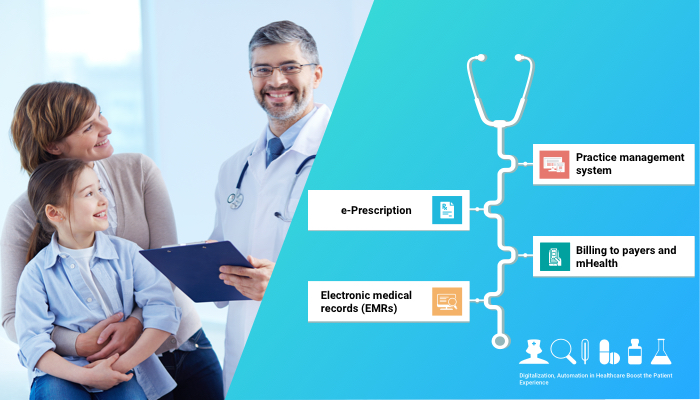How Intelligent Healthcare Management Systems Are A Boon to Clinics and Hospitals?


As smartphone technology gets infinitely smarter over time, healthcare apps are becoming equally smart, multi-functional and user-friendly. Until 2017, there were over 325,000 recorded healthcare mobile apps in the top app stores around the world with Android topping the list (source: research2guidance). The major driving forces behind this exponential increase is the ever-inflating adoption of smartphones, coupled with heavy investment in the digital health market which fuels healthcare mobile app development.
Many medical facilities are adopting innovations in healthcare mobility solutions in order to be compliant with various healthcare regulations and standards like HIPAA, ACA, etc. Some of them are adopting the digital trends to provide quality healthcare to their patients. With the growing healthcare needs of people across the globe, not only physically but also remotely (through smartphones), healthcare mobility solutions for doctors and practices can be a blessing.
Medical healthcare professionals could face an abundance of challenges if they choose not to adopt digitalization/healthcare mobility solutions such as:
- Haphazard appointment management and scheduling systems
- Suboptimal experience for patients while dealing with the availability of physicians
- Shoddy invoicing and payment processing consuming a large amount of time
- Medical records and history are scattered across places, and there is no centralized medical history for each individual at one place
- Patients are unable to trust the healthcare professionals due to lack of proper communication and information
To counter the above challenges, hospitals and healthcare professionals should go for Healthcare Management Systems. These systems are designed to provide a solution to manage the practice and processes pertaining to hospitals thereby improving the quality of patient care. It improves the overall operational efficiency of hospital staff. There is effective exchange of information between hospital/physicians and patients, thus improving communication between facility and patients.
Use Case
Consider the scenario, where a patient wishes to book an appointment with an orthopaedic doctor. With the absence of healthcare mobile apps, a patient would be confronted with the harrowing experience of visiting a clinic for an appointment, which leaches on valuable time. Now, with the advancements in digital technology, we can book the appointments through the mobile app itself in the comfort of our very homes.

This is just one of the arrays of features that Healthcare Management Systems can provide. There is a plethora of other features available in a Healthcare Management System, which we will look into further.
Healthcare Management System
The features of an efficient Healthcare Management System are manifold and doctors can use them in an abundance of situations as below:

Centralized patient history
- You will be able to gain access to Electronic Health Records (EHRs) and Electronic Medical Records (EMRs). You can bid farewell to the out-dated paper records and step into the digital age.
- It can segregate past procedure information which is done at local clinics and medical history, both of which are kept separate from each other.
- It is designed in an efficient manner which mandates for medical information to be input only once. After that, this data is stored in a centralized server which can be accessed easily.
Efficiently managed appointments
- Your patients will be able to schedule appointments online in accordance with the slots provided by you. They can also cancel and reschedule the appointments. An HMS also acts as a calendar for doctors where the schedule can be checked and managed, if needed. Timely reminders are another advantage of this system.
- It can provide Electronic Medical Records (EMRs) clubbed with Patient Scheduler that is customized based on practice needs.
Dedicated interaction between patient and physician
- It provides patient-doctor communication feature which acts as an instant messaging tool between the two parties. It avoids the middleman and provides healthcare, even in the most remote areas.
Hospital and pharmacy management solutions
- These solutions for hospitals eliminate errors due to manual involvement, tracks pharmacy inventory online thereby avoiding pilferage of medications. It has better control over the inventory thereby improving profit margins. It promotes efficient workflow processes as well.
E-prescriptions
- Ability for the physicians to e-prescribe a prescription to a patient thereby eliminating prescription drug errors. It also speeds up the medical settlement process.
Chronic care management
- This solution facilitates physicians to share the care plan with patients. Patients can key in their exact health status daily. Clinical staff gets access to real-time data along with remote monitoring of vitals.
Reminder feature for patients
- Reminds the patients to take care of their illnesses by notifying to consume medicines at right times.
Final Verdict
Healthcare consumers are continually showing increased usage of digital technology, with numbers exponentially rising with every passing year. Market for healthcare mobile app development is growing at an enormous speed. Research shows that this market will reach $26 billion by 2017 (source: research2guidance). Healthcare mobile apps and healthcare mobility solutions are being increasingly sought out by doctors and consumers alike.
Author Bio
Manisha Bathia is a Project Manager at Biz4Solutions with 14+ years of experience in Project Management, Quality Assurance and Test Management in IT-related services. She has expertise in various domains like Healthcare, Finance, Water technologies, Transportation, Telecom, etc. She has experience in defining and implementing quality management strategies to ensure exceptional delivery of software projects.
Social media profile link – https://www.linkedin.com/in/manisha-bathia-10285116/



